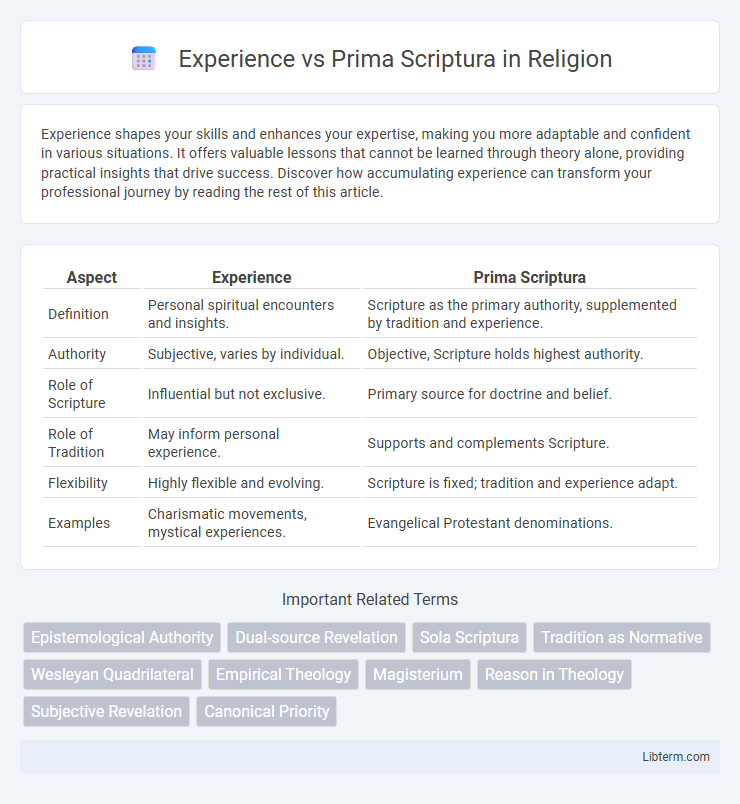Experience shapes your skills and enhances your expertise, making you more adaptable and confident in various situations. It offers valuable lessons that cannot be learned through theory alone, providing practical insights that drive success. Discover how accumulating experience can transform your professional journey by reading the rest of this article.
Table of Comparison
| Aspect | Experience | Prima Scriptura |
|---|---|---|
| Definition | Personal spiritual encounters and insights. | Scripture as the primary authority, supplemented by tradition and experience. |
| Authority | Subjective, varies by individual. | Objective, Scripture holds highest authority. |
| Role of Scripture | Influential but not exclusive. | Primary source for doctrine and belief. |
| Role of Tradition | May inform personal experience. | Supports and complements Scripture. |
| Flexibility | Highly flexible and evolving. | Scripture is fixed; tradition and experience adapt. |
| Examples | Charismatic movements, mystical experiences. | Evangelical Protestant denominations. |
Defining Experience and Prima Scriptura
Experience in theology refers to the personal and communal encounters with the divine or spiritual realities, forming an interpretative lens for understanding faith and biblical teachings. Prima Scriptura, meaning "Scripture first," asserts that while experience, tradition, and reason contribute to theological insights, Scripture remains the primary and authoritative source for doctrine and practice. Defining Prima Scriptura emphasizes the supremacy of biblical texts over subjective experience, ensuring doctrinal consistency grounded in canonical authority.
Historical Roots of Prima Scriptura
Prima Scriptura emerged in the early Christian church as a response to the need for authoritative guidance based primarily on the Bible, while acknowledging the value of tradition, reason, and experience under scripture's supremacy. Its historical roots trace back to the early Church Fathers, who emphasized Scripture as the foundational source of divine truth but allowed for interpretive insights from apostolic tradition and communal experience. This approach contrasts with strict sola scriptura by integrating secondary authorities that must align with and be subordinate to the primacy of Scripture.
The Role of Personal Experience in Faith
Personal experience plays a pivotal role in the framework of Experience theology by serving as a direct and subjective encounter with the divine, validating faith through individual spiritual insights and revelations. Prima Scriptura upholds Scripture as the primary authority but allows personal experience to complement biblical teachings, ensuring that faith remains anchored in the historical and theological truths of the Bible. The balance between experience and Scripture shapes how believers interpret divine guidance, blending empirical faith encounters with scriptural mandates.
Scripture’s Authority versus Experiential Knowledge
Prima Scriptura asserts the primacy of Scripture as the ultimate authority in faith and practice, superseding experiential knowledge which is subordinate and always tested against biblical revelation. Experiential knowledge, while valuable for personal understanding and guidance, is fallible and subject to error, emphasizing the necessity of Scripture to provide an objective, unchanging standard. This distinction safeguards doctrinal purity by rooting belief systems in the inerrant Word of God rather than subjective individual experience.
Philosophical Foundations of Prima Scriptura
Prima Scriptura is grounded in the philosophical belief that Scripture holds ultimate authority while allowing other sources, such as tradition, reason, and experience, to inform understanding without overriding biblical texts. This approach assumes an epistemological hierarchy where Scripture is the primary form of divine revelation, making all other knowledge subsidiary. Philosophically, it navigates the tension between empirical knowledge derived from experience and the theological certainty found in scripture, emphasizing a revelatory foundation for truth.
Interpretive Challenges in Experience and Scripture
Experience often introduces subjective interpretations influenced by personal biases, emotions, and cultural contexts, complicating consistent understanding. Prima Scriptura emphasizes the primacy of Scripture, aiming to anchor interpretation in authoritative biblical texts while acknowledging subordinate insights from experience and tradition. The challenge lies in balancing experiential insights with scriptural fidelity to avoid misinterpretations or doctrinal errors.
Case Studies: Experience Shaping Doctrine
Case studies illustrate how Experience influences doctrine by revealing how lived realities prompt theological reflection and adaptation within various Christian communities. For example, the Charismatic movement's emphasis on spiritual gifts emerged from practitioners' experiential encounters with the Holy Spirit, challenging traditional interpretations rooted in Prima Scriptura that prioritize scripture alongside tradition and reason. This dynamic interplay shows Experience actively shaping doctrinal development by validating or reinterpreting scriptural texts in light of concrete communal contexts and historical moments.
Complementary or Contradictory: Experience and Prima Scriptura
Experience and Prima Scriptura can be viewed as complementary rather than contradictory in theological contexts. Prima Scriptura holds that Scripture is the primary authority, while experience serves as an interpretive lens that enriches understanding without superseding biblical text. This dynamic allows believers to integrate personal and communal experiences with the foundational truths of Scripture for a more holistic faith practice.
Impact on Modern Christian Practice
Experience shapes individual faith expressions by emphasizing personal encounters with the divine, often resulting in diverse worship styles and interpretations across Christian communities. Prima Scriptura prioritizes Scripture as the primary authority, guiding doctrine and practice while allowing tradition and experience to inform but not override biblical teachings. This balance impacts modern Christian practice by fostering a faith that honors biblical foundations while embracing the dynamic role of lived experience in spiritual growth and community life.
Navigating Tensions: Toward a Balanced Approach
Navigating tensions between Experience and Prima Scriptura requires recognizing the strengths of both as sources of authority in Christian life. Experience offers personal insights and contextual understanding, while Prima Scriptura upholds Scripture as the primary lens through which all experiences must be interpreted. Balancing these approaches involves submitting experiential knowledge to the authoritative teachings of Scripture to ensure alignment with core doctrinal truths.
Experience Infographic

 libterm.com
libterm.com